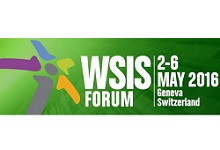Media: Promote media freedom and internet universality at the heart of achieving SDG target 16.10
5 May 2016 09:00h
Event report
[Read more session reports and live updates from the WSIS Forum 2016.]
Starting from the aim of SDG 16.10 ‒ to ‘ensure public access to information and protect fundamental freedoms, in accordance with national legislation and international agreements’ ‒ the Panel explored ways to implement the rights of individuals online. Ms Xianhong Hu (UNESCO) shared the work of UNESCO related to freedom of expression and Internet universality, proposing two different indicators for SDG 16.10 about the safety of journalists and access to information. She referred to a number of verified cases of murder, kidnapping, enforced disappearance, arbitrary detention, and torture of journalists in the previous 12 months and the existence and implementation of constitutional, statutory and/or policy guarantees for public access to information.
Ms Malgorzata Pek (Directorate General of Human Rights and Rule of Law, Council of Europe) reaffirmed the role of the Council of Europe in the protection of journalists, by creating a working platform enabling and helping member states to take relevant actions in this direction. On 13 April 2016, the Committee of Ministers adopted a Recommendation about the protection of journalists, based on the European Court of Human Rights (ECHR) Guidelines, aimed at pushing member states to review their legal frameworks. In this Recommendation, four pillars are taken into account: prevention, protection, prosecution, and exchange of information.
Journalists are workers who have labour rights. Mr Rafael Diez Medina (ILO) underlined the importance of the International Federation of Journalists in protecting their rights as workers. Indeed, freedom of expression necessarily needs to include the right to create a trade union, as a form of freedom of association. One way to protect the security of journalists is to enhance and maintain the International Federation.
Another relevant topic related to freedom of expression is the question of the monopoly/oligopoly of media corporations. Mr Alfonso Carlo Alberto (Brazilian Internet Steering Committee) presented the Brazilian situation. He stated that today, journalists are corporate media employees, mostly manipulated by media corporations. In order to improve freedom of expression and protect journalists, it is necessary, in his view, to enhance independence and the plurality of media corporations.
More generally, it was stressed that freedom of expression is not only a goal, but also represents an indispensable means to achieve all the other SDGs, such as reduction of forms of violations, reduction of abuse exploitations, equal access to justice, and the fight against all forms of crimes. It is important to note that we cannot achieve the SDGs without freedom of expression and free press.
Finally, an African perspective was offered on this problematic issue. State security laws are often abused, threatening free speech. For this reason many journalists have left the offline world to join online communities, thinking that the online world would be safer. However, the risks they find online are the same (or even worse) than what they face in the offline world.
In conclusion, the importance of cooperation among different stakeholders was reaffirmed in order to formulate a comprehensive strategy to implement WSIS Action Line C9 Media in the post-2015 phase as a crucial contribution to achieving the SDGs, particularly SDG 16.10.
by Emanuele Sacchetto
Related event

